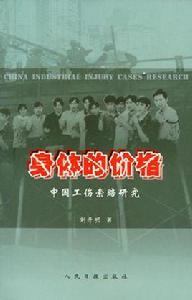內容介紹
作者以周立太律師所代理的600多宗工傷索賠案件為基礎, 詳實的記錄了工傷者索賠的艱難經歷。作者在展現工傷工人艱難索賠道路的同時, 著重探討了工傷索賠過程所遇到的種種難題, 因為在法律法規和政策的背後是結構性和制度性的社會弊端。他希望藉這些工傷索賠案例, 呈現出中國勞工所面臨的生存困境, 喚起不同階層的人們對工傷員工的權益保障及其生存發展的重視。
This research project, which is founded on field research, makes use of over 600 labor injury cases handled by lawyer Zhou Li Tai in order to research the living conditions and claims of injured workers. This research reflects the basic problems that exist within the laws and judicial system. Through these labor injury cases, the research proposes to reveal the living difficulties faced with Chinese labor, arouse social regard on rights protection of injured workers and their development. This study was funded by Oxfam Hong Kong.
January 1998, Dr. Liu Kaiming happened to meet lawyer Zhou Litai, and his party — more than ten injured workers at a room in Sanhe county Longgang, Shenzhen city. Dr. Liu was strongly touched by their tragedies, and was urged to go into factories, workers dormitories, hospitals to probe into the real stories behind “Shenzhen‘s miracles”. Soon, he found that when these injured workers came to Shenzhen, they were all filled with good dreams. Unfortunately, their dreams were broken when they were injured by machines. Even worse, few of them could receive legal and reasonable compensation over what their bodies endured. So, they seek help from lawyer Zhou to accuse against employers and the local government. Dr. Liu focused his attention on their litigation process all the time. On June 19, 1998, the administration justice court of Shenzhens middle court heard the case, which was Wangqiong and other six workers proceeded against the Social Insurance Supervising Authority Longgang Branch. The final judgment supported Wang qiong and other six workers. Next day, Dr. Liu published this news on the front page of newspaper which he worked for, and reported the difficult process of this case and the disagreement between ‘workers and ‘governors, which attracting highly concern about the Shenzhen‘s working accidents/industrial injury.
The report shows the poor migrant workers are the main part victims of workplace injury and occupational disease. The individuals in most cases in the report are from countryside as economic backbone in their families. Their injury and disease pushed their families into extremely difficult position. The member of investigation group interviewed more than 20 injured workers in Sichuan, Chongqing, Hunan, Anhui and Jiangsu province. Although they got some economic compensation, to themselves and their families, it cannot match with what they paid out. Under the existed countryside social security system, it is really too heavy to undertake the cost of cities modernization and industrialization by poor countryside.
作者介紹
劉開明
Liu Kaiming
深圳當代社會觀察研究所所長
Executive Director of The Institute of Contemporary Observation (since 2001)
南京大學文學博士
PH.D. in Literature from Nanjing University
1965年出生於廣西,南京大學文學博士,深圳當代社會觀察研究所的創辦人兼所長;1998年開始從事勞工與企業社會責任的研究,已經出版了8部專著(中文、英文和芬蘭文) ,是勞工標準、人權、企業社會責任、供應鏈管理方面的專家。自2007年起,擔任商業與人權資源中心國際顧問委員會成員;2003年3月到2006年8月間,擔任社會責任國際董事會成員(Social Accountability International),該機構開發和管理SA8000企業社會責任標準; 2006年4月到2007年4月,受歐盟委員會委託,擔任歐盟中歐合作戰略考察組成員,負責人權、法治和良好治理。在2002年到2005年間,參加了世界銀行、國際勞工組織和國際樂施會開展的全球供應鏈勞工狀況的研究項目;他也是國內外相關論壇的經常發言人,從2003年到2008年,受邀請分別在哈佛大學、耶魯大學、世界銀行總部、國際勞工組織曼谷局、歐盟議會、東京聯合國大學、亞洲開發銀行研究所等機構發表勞工問題的報告。
From 1998 onward, Liu Kaiming has been one of Chinas most active experts in the field of corporate social responsibility, and has gained a far-reaching reputation in the fields of labor research, human rights activism, supply-chain risk management, and worker ability development. In March of 2001, he founded the Institute of Contemporary Observation (ICO), Chinas first non-profit organization dedicated to labor development and corporate social responsibility. In March 2003 he became an Advisory Board member of Social Accountability International. In March of 2004 he founded the Migrant Workers Community College, within which ICO could conduct community education. Before founding ICO, he was a professor in Guangxi Normal Universitys Chinese department (1990-1994) and a journalist for the Shenzhen Legal Daily (1997-2002)

